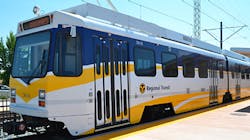Caltrans awards $146 million to transit projects
The California Department of Transportation (Caltrans) has released $146 million from the Low Carbon Transit Operations Program (LCTOP) to 180 transit projects around the state.
These projects help reduce greenhouse gas emissions from cars by increasing the convenience, capacity and ridership of buses and trains around the state—meaning fewer cars on the roads, people using more sustainable modes of transit and cleaner air for the community. The projects reduce or even eliminate fares in some cases, create or expand services, increase use of zero emission technology and improve facilities.
“Our current transportation system is congested and impacts the health of our communities and our planet,” said Bob Franzoia, acting director of Caltrans. “This funding gets people out of their cars by providing newer and cleaner ways to travel.”
More than 160 of the projects and $142 million will specifically benefit disadvantaged communities, low-income communities, or low-income households within a half-mile of a disadvantaged community. These areas are the most affected by the changing climate.
LCTOP is one of several state programs under the California Climate Investments (CCI), funded through auction proceeds from the California Air Resources Board’s (CARB) Cap-and-Trade Program. Funding from LCTOP provides operating and capital assistance for transit projects that reduce greenhouse gas emissions and benefit disadvantaged and low-income communities and households (defined by the California Environmental Protection Agency) throughout California.
Below are a few examples of the types of projects which received funding this year:
Projects to offer free or reduced fares:
Orange County Transportation Authority (OCTA): Three projects to provide travel training and free or reduced fares for senior, disabled and youth riders from three community colleges within the region. ($1.6 million)
Stanislaus County Transit Agencies (Ceres Area Transit, Modesto Area Express, Stanislaus County Regional Transit, and Turlock Transit): Four projects for free or reduced fares on designated dates throughout the year. These will kick off in July of 2019 with a free fare on all fixed route buses. ($1 million)
City of Los Angeles: Free fare on LADOT DASH services for LAUSD K-12 students and Los Angeles Community College students. ($1.1 million)
Projects for new or expanded transit service:
Sacramento Regional Transit District: Three projects to expand light-rail services for South Sacramento, Sunrise to Folsom, and expanded service to and from downtown Sacramento’s Golden1 Center. ($3.5 million)
City of Fresno Department of Transportation (FAX): Two projects to expand weekday night service and increasing frequency on weekend service. ($1.1 million)
Los Angeles County Metropolitan Transportation Authority (LA Metro): Two projects to expand service on the Expo and Gold Lines. ($36.6 million)
Projects to purchase zero-emission vehicles:
Napa Valley Transportation Authority: Two years of LCTOP funding will be combined to purchase one extended-range zero-emission electric bus and charging station. ($299,971)
Eastern Sierra Transit Authority: Purchase an electric vehicle for dial-a-ride service as a replacement. ($61,568)
San Diego Metropolitan Transit System: Continuation of a project to procure 11 zero emission buses as a pilot to move into zero emission bus technology. This includes 9 electric buses, 2 hydrogen buses and 12 depot chargers. ($6.2 million)
Projects improving facilities to increase and encourage ridership:
City of McFarland: First time awardee to procure and install a transit facility to enhance operations and maintenance for dial-a-ride fleet. ($28,158)
Lake Transit: Purchase and install a solar canopy to enhance transit operations and utilize renewable energy to decrease operational costs. ($127,647)
Tahoe Transportation District: Purchase and construct bus stop improvements and enhancement at the Lake Tahoe Community College Mobility Hub. ($126,677)
